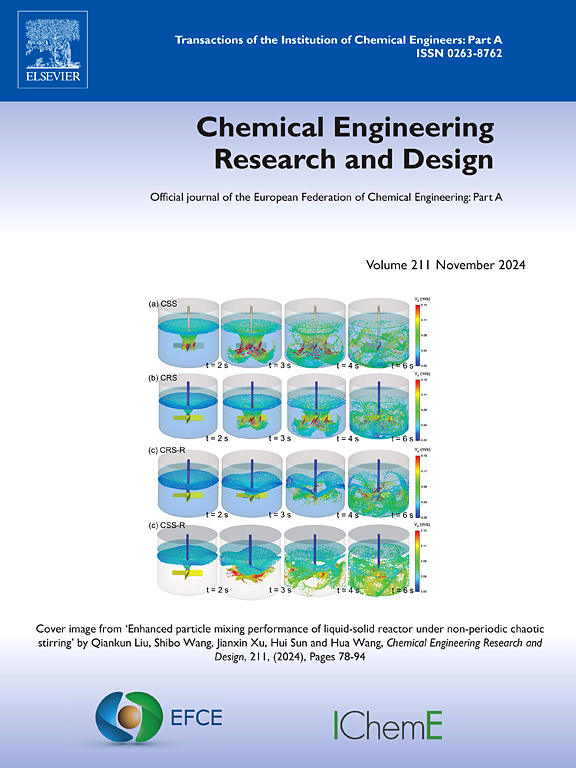Energy balance error compensated extended-state Kalman filter-based model predictive control of a 300 MW boiler-turbine unit
IF 3.7
3区 工程技术
Q2 ENGINEERING, CHEMICAL
引用次数: 0
Abstract
Coal-fired power plants are crucial for grid stability due to their dispatchability in response to the intermittency of renewable power generation. However, the frequent and rapid load variations pose great challenges to the flexibility and stability of operational control systems. To this end, this study proposes a novel energy balance error compensated extended-state Kalman filter-model predictive control (EBEC-ESKF-MPC) strategy for boiler-turbine units, inspired by the direct energy balance (DEB) framework. A linearized state-space model serves as the nominal model for MPC design, while an ESKF incorporating energy balance error compensation ensures accurate state estimates. The non-dominated sorting genetic algorithm II is applied for the multi-objective optimization of key weights. The wide-range simulations demonstrate that the proposed strategy achieves a significant improves pressure control performance, outperforming DEB-PI, DEB-active disturbance rejection control (ADRC), and ESKF-MPC by 58.9 %, 31.5 %, and 10.2 % respectively. Additionally, the EBEC-ESKF-MPC strategy achieves the shortest settling time and minimal control deviation under uncertain disturbance scenarios. Moreover, the proposed strategy's ability to reduce total absolute energy deviations by 92.3 %, 78.9 %, and 37.8 % compared to DEB-PI, DEB-ADRC, and ESKF-MPC, respectively, highlighting its superior disturbance rejection, control precision, and energy balance capabilities.
基于能量平衡误差补偿扩展状态卡尔曼滤波器的 300 兆瓦锅炉汽轮机组模型预测控制
燃煤电厂对电网的稳定性至关重要,因为它们具有可调度性,可以应对可再生能源发电的间歇性。然而,频繁、快速的负荷变化对运行控制系统的灵活性和稳定性提出了很大的挑战。为此,本研究在直接能量平衡(DEB)框架的启发下,提出了一种新的能量平衡误差补偿扩展状态卡尔曼滤波模型预测控制(EBEC-ESKF-MPC)策略。线性化状态空间模型作为MPC设计的标称模型,而包含能量平衡误差补偿的ESKF可确保准确的状态估计。采用非支配排序遗传算法II进行关键权值的多目标优化。大范围仿真结果表明,该策略的压力控制性能显著提高,分别优于DEB-PI、deb -自抗扰控制(ADRC)和ESKF-MPC,分别提高58.9% %、31.5% %和10. %。此外,EBEC-ESKF-MPC策略在不确定干扰情况下实现了最短的稳定时间和最小的控制偏差。此外,与DEB-PI、DEB-ADRC和ESKF-MPC相比,该策略能够将总绝对能量偏差分别降低92.3 %、78.9 %和37.8 %,突出了其优越的抗扰性、控制精度和能量平衡能力。
本文章由计算机程序翻译,如有差异,请以英文原文为准。
求助全文
约1分钟内获得全文
求助全文
来源期刊

Chemical Engineering Research & Design
工程技术-工程:化工
CiteScore
6.10
自引率
7.70%
发文量
623
审稿时长
42 days
期刊介绍:
ChERD aims to be the principal international journal for publication of high quality, original papers in chemical engineering.
Papers showing how research results can be used in chemical engineering design, and accounts of experimental or theoretical research work bringing new perspectives to established principles, highlighting unsolved problems or indicating directions for future research, are particularly welcome. Contributions that deal with new developments in plant or processes and that can be given quantitative expression are encouraged. The journal is especially interested in papers that extend the boundaries of traditional chemical engineering.
 求助内容:
求助内容: 应助结果提醒方式:
应助结果提醒方式:


